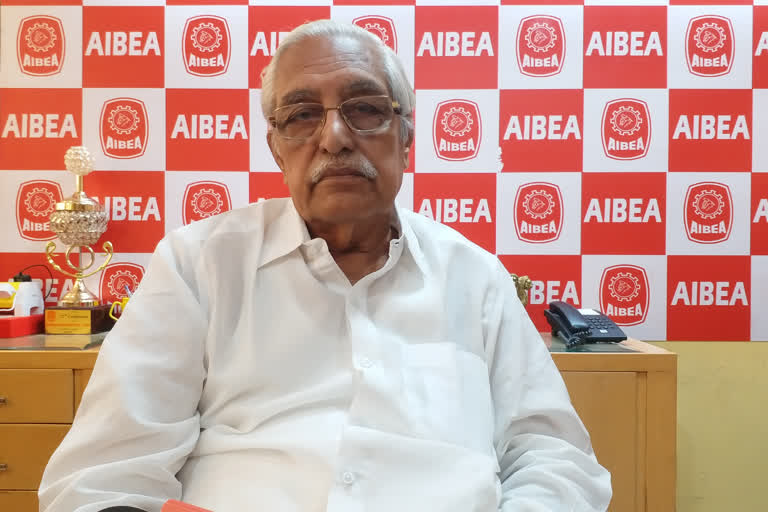Chennai: Calling the nationwide bank strike on March 15 and 16 a 'big success', a top leader of a bank employees' union which took part in said the central government should review its proposal to privatise two public sector banks.
Talking to ETV Bharat, C H Venkatachalam, General Secretary of All Indian Bank Employees Association (AIBEA), said most of the political parties, trade unions and even customers are supporting their protest.
CH Venkatachalam, General Secretary of All Indian Bank Employees Association (AIBEA) speaking to ETV Bharat “The protest was successful. The government must have seen that. Already now most of the political parties have expressed their support. All the trade unions are supporting, people are supporting, customers are supporting. So, it’s a warning signal for the government,” said the AIBEA leader.
He added the employees association will hold talks if the government is ready to review the proposal. "Otherwise, we will intensify our protest,” he said.
The AIBEA is the largest bank employees’ union in the country. The AIBEA, along with the other eight unions, took part in the strike on March 15 and 16 under the umbrella body of the United Forum of Bank Unions (UFBU).
Also Read: Drastic changes in monetary policy framework can upset bond market: Rajan
According to AIBEA, the government treasury operations were affected due to the strike and about 2 crore cheques or instruments worth about Rs 16,500 crore were held up for clearance on March 15 alone.
In early February, the UFBU gave the strike call to protest against the Budget proposal to privatise two public sector banks in the next financial year.
“Other than IDBI Bank, we propose to take up the privatization of two Public Sector Banks and one General Insurance company in the year 2021-22," said the Union Finance Minister Nirmala Sitharaman on Feb 1 while presenting the Budget in the Lok Sabha.
Besides privatisation of banks, the UFBU is protesting against the setting up of a bad bank, initial public offering of LIC, allowing up to 74 per cent foreign direct investment into the insurance sector among others.
PSBs are essential for achieving USD 5 trillion economy
On being asked what prompted the employees to protest against the government’s move, CH Venkatachalam said that the privatisation of public sector banks has devastating effects on employees as well as on the general public.
"First of all, it will affect the bank employee's social security, promotion, and equal pay. Fresh employment opportunities will diminish, needless to say, socially backward sections will lose reservation in job openings," he said.
ALSO READ: Traditional lenders retake digital initiative in A-Pac: S&P
The trade union leader also raised concerns about rural development and banking in the hands of private players.
"Private corporations are profit-driven and they don't care to set up branches in rural areas to serve poor people. Private banks will not lend loans to crucial sectors of national development such as Agriculture, Education, Rural development, Women empowerment. Public sector banks are essential for achieving the 5 trillion-dollar economy goal of the Modi Government," he added.
On ‘Bad Bank’ proposal
When asked about the employee unions objection to the ‘bad bank’ proposed by the Budget 2021-22, the veteran leader said that the proposal appears to be a big joke as the private companies were allowed to evade the loans in the first place.
“Private companies have taken crores of bank loans and they are not repaying. We are incurring losses as these loans are written off. Now it is a joke to say banks will be given to the private sector to solve this problem,” he complained.
Announcing the setting up of a ‘Bad Bank’ during the Budget Speech, the Finance Minister said: “An Asset Reconstruction Company Limited and Asset Management Company would be set up to consolidate and take over the existing stressed debt and then manage and dispose of the assets to Alternate Investment Funds and other potential investors for eventual value realization.”
The purpose of a bad bank is to protect the good assets from the impact of the bad ones and strengthen the bank’s balance sheet. Essentially, the ‘Bad Bank’ buys non-performing assets from banks and sells those assets to suitable investors.
Also Read:Nirmala Sitharaman to move Insurance Amendment Bill 2021 in RS today
